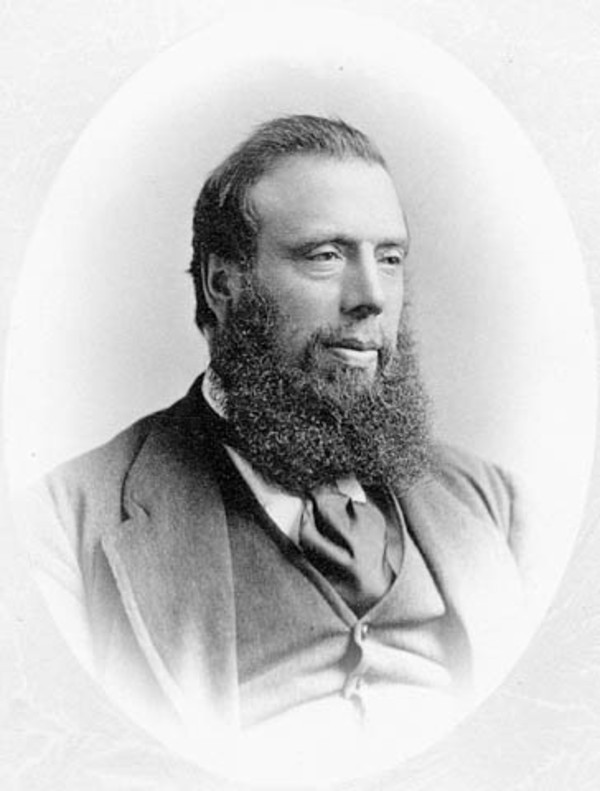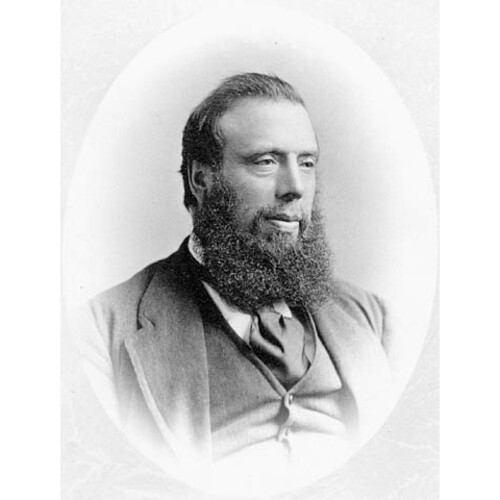FERGUSON, THOMAS ROBERTS, merchant, soldier, Orangeman, and politician; b. December 1818, at Drumcor, County Cavan, Ireland, son of Andrew Ferguson; d. 15 Sept. 1879, in Innisfil Township, Ont.
Thomas Roberts Ferguson’s parents left Ireland for Upper Canada during the late 1830s; his father died en route. After a brief stay in Montreal, the family settled near Cookstown in 1842 where Ferguson became a farmer. He bought more property in Innisfil Township and established each of his brothers on a farm before becoming a merchant in Cookstown. In 1856 he married Frances Jane Gowan, daughter of Orange leader Ogle Robert Gowan, and they had three sons and six daughters. Ferguson had joined the Orange order in 1847 and he became a prominent member. In 1852 he was master of the Loyal Orange Lodge no.1580 and in June 1858 he was elected one of the deputy grand masters of the order. From 1867 to 1873 he was a director of the Northern Railway, and in 1872 he became a provisional director of the Huron and Ontario Ship Canal Company.
Ferguson served from 1847 as an officer with the 4th Battalion and then the 7th Battalion Simcoe militia. In 1861 he was instrumental in the establishment of the 1st Rifle Company of volunteer militia of Cookstown, to which he was appointed captain on 13 June 1862. He rose to the rank of lieutenant-colonel by 1865. The next year he led his company against the Fenians at Fort Erie; in the engagement Ferguson accompanied John Stoughton Dennis* on the tug W. T. Robb and met the Fenians under John O’Neill as the latter was leaving Canada. Lieutenant Christopher Cook later charged Ferguson with misconduct in matters of morale and money. He was acquitted of the charges, and on 25 June 1869 he was provisionally appointed major with the “Simcoe Foresters,” the 35th Battalion of the Volunteer Infantry. He held this post until his retirement in 1873.
When the first council of Innisfil Township had been formed in 1850, Ferguson was elected a councillor. From 1852 to 1873 he served on the council, four years as councillor and 18 years as reeve. He was also warden of Simcoe County in 1858 and from 1862 to 1867.
A Conservative, Ferguson first ran for a seat in the Legislative Assembly in the election of 1858 against Tory William Benjamin Robinson. In this election, and subsequently in 1861 and 1863, he was returned for Simcoe South. In 1867 and 1872 he was elected by acclamation to represent Simcoe South in the Legislative Assembly for Ontario. He also campaigned successfully in Cardwell in 1867 for a seat in the House of Commons but did not run in 1872.
Ferguson was a strong advocate of representation by population and during his first term in the assembly he moved for the adoption of a bill to introduce it into law. On 19 Oct. 1860, Ferguson was appointed arbitrator on behalf of Simcoe County to see to the maintenance and repair of the Holland River bridge at Bradford. As a politician, he was concerned about local and county affairs and about the people he represented. He wrote letters supporting their petitions on a wide variety of subjects, including the release of prisoners whom he felt had been punished too severely by lengthy sentences for minor crimes; he was often actively involved on their behalf, for example in 1857 and 1859 when he attempted to prevent the incorporation of a section of the Innisfil Township into Barrie.
In 1872 at a political meeting in Bradford, Ferguson frustrated the intention of its sponsors to condemn acts of the federal government. When the meeting was over and the majority of people had left, however, a fight broke out; in attempting to stop it, Ferguson suffered a serious blow to his head which caused permanent physical and mental damage. As a result, he resigned his seat in the Ontario legislature in 1873 and he was prevailed upon to accept the office of collector of customs at Collingwood. Shortly after the Liberal government of Alexander Mackenzie* came to power in 1873, Ferguson was moved to Toronto. In 1876 he was dismissed without compensation or apology. He spent his remaining years at his home in Cookstown where he died of paralysis at 60 years of age.
PAC, MG 26, A (Macdonald papers), entries for T. R. Ferguson; MG 27, I, E30 (T. R. Ferguson papers); RG 5, C1, 557, no.906; 587, no.2026; 613, no.597; 636, no.1580; 680, no.558; 681, no.585; 682, nos.595, 617; 683, no.652; 706, no.489; 742, nos.639, 640; 772, no.391; 779, nos.781, 795; 782, no.908; 804, nos.507, 508; 851, nos.853, 854; 868, no.54; RG 9, I, C1, 19, 20; C3, 11; C6, 7; 174, no.1002; RG 30. [G.-É. Cartier], Discours de Sir Georges Cartier . . . , Joseph Tassé, édit. (Montréal, 1893). Can. directory of parliament (Johnson). Can. parl. comp., 1867; 1869; 1871; 1872. Hunter, Hist. of Simcoe County. Innisfil Township centennial, 1850–1950, June 23–24, 1951; a record of 100 years of progress, historical review ([Barrie, Ont., 1951]).
Cite This Article
Carole B. Stelmack, “FERGUSON, THOMAS ROBERTS,” in Dictionary of Canadian Biography, vol. 10, University of Toronto/Université Laval, 2003–, accessed February 17, 2026, https://www.biographi.ca/en/bio/ferguson_thomas_roberts_10E.html.
The citation above shows the format for footnotes and endnotes according to the Chicago manual of style (16th edition). Information to be used in other citation formats:
| Permalink: | https://www.biographi.ca/en/bio/ferguson_thomas_roberts_10E.html |
| Author of Article: | Carole B. Stelmack |
| Title of Article: | FERGUSON, THOMAS ROBERTS |
| Publication Name: | Dictionary of Canadian Biography, vol. 10 |
| Publisher: | University of Toronto/Université Laval |
| Year of publication: | 1972 |
| Year of revision: | 1972 |
| Access Date: | February 17, 2026 |




